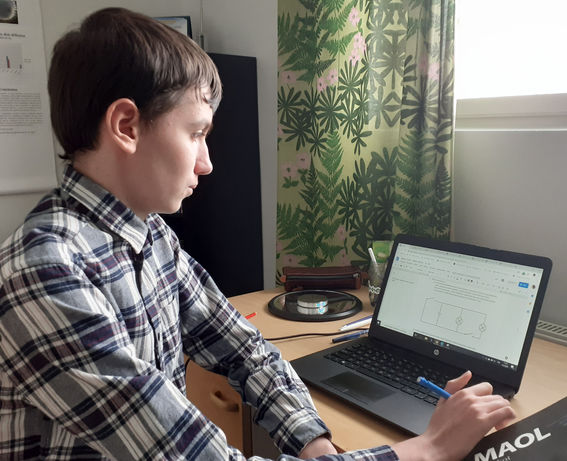Adam Yousfi wins the Millennium Youth Prize with his work on water pumps

The Millennium Youth Prize innovation competition was held for the second time this year, and the top prize of EUR 5 000 went to Adam Yousfi from the science and technology stream of Kulosaari General Upper Secondary School. His work on water pumps was a response to the challenge of removing society’s dependence on carbon. The jury rated the author as a modern day Da Vinci and noted the impressively high standard of the technological solution proposed.
The second-place prize (EUR 3 000) went to Indra Halviala from Ressu General Upper Secondary School and third place (EUR 2 000) went to Martta Matinaho and Saara Matinaho from Tapiola General Upper Secondary School.
In the competition, young people sought solutions to four global sustainable development challenges presented by Aalto University professors. The students could submit their entries to the competition as either a written report, video or prototype.
The winners of the Millennium Youth Prize, organised by Aalto University and Technology Academy Finland (TAF), were revealed in the competition final, which was broadcast online on 9 October 2020. The winners were elected by a jury composed of members of Aalto University and TAF, and this jury was chaired by Aalto University’s Vice President for Research Ossi Naukkarinen. The criteria used for evaluating the competition submissions were scientific quality, imagination, creativity, innovativeness and feasibility.
According to Naukkarinen, the challenges were very demanding and all the finalists’ proposals were excellent. He believes that all the finalists have a great future ahead of them as innovators. Many of the submissions also generated interesting follow-up questions.
The Millennium Youth Prize seeks out innovations that improve life on our planet and inspire young people to work with technology and innovations. The competition is modelled on the international Millennium Technology Prize.
Winning teams' proposals
Adam Yousfi / Kulosaari coeducational school, general upper secondary school, science and technology curriculum: Hydroelectric pump
The hydroelectric pump improves the efficiency of hydroelectric power and thus reduces the carbon dependency of our society. Technically, the invention is based on solutions already in use that have been demonstrated to function well. The hydroelectric pump can be deployed in moderately fast-flowing rivers and as a prime investment solution for use together with the current infrastructure of existing hydroelectric power stations. The solution doesn’t introduce competition at the expense of existing hydroelectric power stations, but rather strengthens their capacity in a cost-effective manner.
Indra Halviala / Ressu General Upper Secondary School: Use of giant kelp and algae scrubbers to remove microplastics and nanoplastics from sea water
This method of removing microplastics and nanoplastics from sea water uses giant kelp and algae scrubbers. The process is both efficient and environmentally friendly, because while giant kelp has a large capacity for adsorbing plastic particles, it does not interfere with the important microorganisms in seawater. In addition, because the kelp stores carbon as it grows, it can be processed to produce biomass, biofuel and energy, which in turn enables the commercialisation of the method in line with the sustainable circular economy model.
Martta Matinaho and Saara Matinaho / Tapiola General Upper Secondary School: Bivalve molluscs as a solution to marine plastic problems
This solution involves isolating within bacteria or larvae a gene that produces an enzyme that breaks down plastic. This gene is modified to be as efficient as possible and to function effectively in marine conditions, then it is transplanted into bivalve molluscs. Cultures of these genetically modified bivalve molluscs are then introduced into the sea, or alternatively the molluscs are placed directly on the seabed. As the bivalve molluscs filter the water, the enzyme breaks down the microplastics, thus reducing the quantity of these plastics in the sea.
The new Millennium Youth Prize challenges will be published on 13 November 2020 at www.aaltojunior.fi.
Additional information:
Veli-Matti Ikävalko
Coordinator, DPhil, MsSc (Tech)
Aalto University Junior
veli-matti.ikavalko @ aalto.fi
tel. + 358 50 3511103
Read more
Open-minded innovations from young people improve the life of our planet (aalto.fi)
Read more news

Significant donation to boost pavement engineering research and education
Companies and associations in the field have donated €400,000 to the School of Engineering.
‘Mesoscale’ swimmers could pave way for drug delivery robots inside the body
Researchers have discovered how tiny organisms break the laws of physics to swim faster — such secrets of mesoscale physics and fluid dynamics can offer entirely new pathways for engineering and medicine.
Design strengthens industrial competitiveness – human-centered factory work at the core
Factory work is undergoing a transformation: new technologies and artificial intelligence are changing the content and roles of work. Aalto University’s Department of Design is studying this change from a human-centered perspective in the HiFive project.






